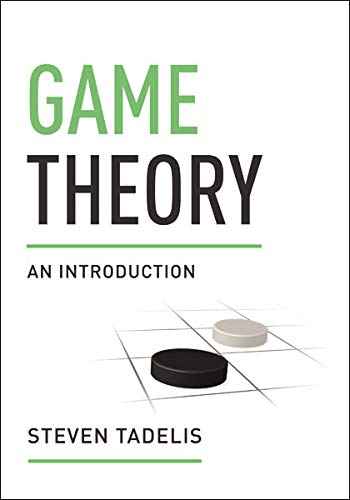Sarin Chair in Strategy and Leadership | Professor of Economics
Business & Public Policy | Economic Analysis & Policy
Leading expert on e-commerce and internet economics
About
Steve Tadelis holds the Sarin Chair in Strategy and Leadership and is a Professor of Economics at the Haas School of Business, UC Berkeley. His research primarily revolves around e-commerce and the economics of the internet. Read More
During the 2016-2017 academic year he was on leave at Amazon, where he applied economic research tools to a variety of product and business applications and worked with technologists, computer and ML scientists, and business leaders. During the 2011-2013 academic years he was on leave at eBay research labs, where he hired and led a team of research economists who focused on the economics of e-commerce, with particular attention to creating better matches of buyers and sellers; reducing market frictions by increasing trust and safety in eBay’s marketplace; understanding the underlying value of different advertising and marketing strategies; and exploring the market benefits of different pricing structures.
Aside from the economics of e-commerce, his main fields of interest are the economics of incentives and organizations, industrial organization, and microeconomics. Tadelis explored firm reputation as a valuable, tradable asset; the effects of contract design and organizational form on firm behavior with applications to outsourcing and privatization; public and private sector procurement and award mechanisms; and the determinants of trust.
Expertise and Research Interests
- E-Commerce
- Competition and Industrial Organization
- Procurement Contracting
- Incentives and Economics of Organizations
- Theory of the Firm
- Game Theory
Books
- Mitchell Hoffman and Steven Tadelis. People Management Skills, Employee Attrition, and Manager Rewards: An Empirical Analysis (opens in a new tab). Journal of Political Economy.
How much do a manager’s interpersonal skills with subordinates, which we call people management skills, affect employee outcomes? Are managers rewarded for having such skills? Using personnel data from a large high-tech firm, we show that survey-measured people management skills have a strong negative relation to employee turnover. A causal interpretation is reinforced by several research designs, including those exploiting new workers joining the firm and workers switching managers. However, people management skills do not consistently improve most observed non-attrition outcomes. Better people managers themselves receive higher subjective performance ratings, higher promotion rates, and larger salary increases. - Tom Blake, Kane Sweeney, Sarah Moshary, and Steven Tadelis. Price Salience and Product Choice (opens in a new tab). Marketing Science.
Online vendors often employ drip-pricing strategies, where mandatory fees are displayed at a later stage in the purchase process than base prices. We analyze a large-scale field experiment on StubHub.com and show that disclosing fees upfront reduces both the quantity and quality of purchases. The effect of salience on quality accounts for at least 28% of the overall revenue decline. Detailed click-stream data show that price shrouding makes price comparisons difficult and results in consumers spending more than they would otherwise. We also find that sellers respond to increased price obfuscation by listing higher-quality tickets. - Matt Backus, Tom Blake, Brad Larsen, and Steven Tadelis. Sequential Bargaining in the Field: Evidence from Millions of Online Bargaining Interactions (opens in a new tab). Quarterly Journal of Economics.
.We study patterns of behavior in bilateral bargaining situations using a rich new data set describing back-and-forth sequential bargaining occurring in over 25 million listings from eBay’s Best Offer platform. We compare observed behavior to predictions from the large theoretical bargaining literature. One-third of bargaining interactions end in immediate agreement, as predicted by complete-information models. The majority of sequences play out differently, ending in disagreement or delayed agreement, which have been rationalized by incomplete information models. We find that stronger bargaining power and better outside options improve agents’ outcomes. Robust empirical findings that existing models cannot rationalize include reciprocal (and gradual) concession behavior and delayed disagreement. Another robust pattern at odds with existing theory is that players exhibit a preference for making and accepting offers that split the difference between the two most recent offers. These observations suggest that behavioral norms, which are neither incorporated nor explained by existing theories, play an important role in the success of bargaining outcomes. - Steven Tadelis, Michael Gelman, Shachar Kariv, Matthew Shapiro, Dan Silverman. How Individuals Respond to a Liquidity Shock: Evidence from the 2013 Government Shutdown (opens in a new tab). Journal of Public Economics.
Using comprehensive account records, this paper examines how individuals adjusted spending and saving in response to a temporary drop in liquidity due to the 2013 U.S. government shutdown. The shutdown cut paychecks by 40% for affected employees, which was recovered within 2 weeks. Because the shutdown affected only the timing of payments, it provides a distinctive experiment allowing estimates of the response to a liquidity shock holding income constant. Spending dropped sharply, implying a naïve estimate of 58 cents less spending for every dollar of lost liquidity. This estimate overstates the consumption response. While many individuals had low liquid assets, they used multiple sources of short-term liquidity to smooth consumption. Sources of short-term liquidity include delaying recurring payments such as for mortgages and credit card balances. - Steven Tadelis, Lingfang (Ivy) Li, and Xiaolan Zhou. Buying Reputation as a Signal of Quality: Evidence from an Online Marketplace (opens in a new tab). Rand Journal of Economics.
Seller reputation, generated by buyer feedback, is critical to fostering trust in online marketplaces. Marketplaces or sellers may choose to compensate buyers for providing feedback. Signaling theory predicts that only sellers of high-quality products will reward buyers for truthful feedback, especially when a product lacks any feedback and when the seller is not established. We confirm these hypotheses using Taobao’s reward-for-feedback mechanism. High-quality products, especially without established feedback, are chosen for feedback rewards, which cause sales to increase by 36%. Marketplaces and consumers can therefore benefit from allowing sellers to buy feedback and signal their high-quality products in the process. - Matt Backus, Tom Blake, and Steven Tadelis. On the Empirical Content of Cheap-Talk Signaling: An Application to Bargaining (opens in a new tab). Journal of Political Economy.
We outline a framework for the empirical analysis of signaling games based on three features: sorting, incentive compatibility, and beliefs. We apply it to document cheap-talk signaling in the use of round-number offers during negotiations. Using millions of online bargaining interactions, we show that items listed at multiples of $100 receive offers that are 8–12 percent lower but are 15–25 percent more likely to sell, demonstrating the trade-off requisite for incentive compatibility. Those same sellers are more likely to accept a similar offer, and buyers are more likely to investigate their listings, consistent with seller sorting and buyer belief updating. - Steven Tadelis. Reputation and Feedback Systems in Online Platform Markets. Annual Review of Economics.
2016 - Steven Tadelis, Florian Zettelmeyer. Information Disclosure as a Matching Mechanism: Theory and Evidence from a Field Experiment (opens in a new tab). American Economic Review.
2015 - Steven Tadelis, Chris Nosko, Tom Blake. Consumer Heterogeneity and Paid Search Effectiveness: A Large Scale Field Experiment (opens in a new tab). Econometrica.
2015 - Steven Tadelis, Michael Gelman, Shachar Kariv, Matthew D. Shapiro, Dan Silverman. Harnessing Naturally-Occurring Data to Measure the Response of Spending to Income (opens in a new tab). Science.
2014 - Steven Tadelis, Pat Bajari, Stephanie Houghton. Bidding for Incomplete Contracts: An Empirical Analysis (opens in a new tab). American Economic Review.
2014 - Steven Tadelis, Patrick Bajair, and Robert McMillan. Auctions versus Negotiations in Procurement: An Empirical Analysis. Journal of Law, Economics and Organization.
2009 - Steven Tadelis and Jonathan Levin. Profit Sharing and the Role of Professional Partnerships (opens in a new tab). Quarterly Journal of Economics.
2005 - Steven Tadelis. The Market for Reputations as an Incentive Mechanism (opens in a new tab). Journal of Political Economy.
2002 - Steven Tadelis. Complexity, Flexibility and the Make-or-Buy Decision (opens in a new tab). American Economic Review Papers and Proceedings.
2002
- Counter-stereotypical Messaging and Partisan Cues: Moving the Needle on Vaccines in a Polarized U.S.
1652425200
We report a large scale randomized controlled trial designed to assess whether the counter-stereotypical messaging and partisan cues can induce people to get COVID-19 vaccines. Our study involves creating a 27-second video compilation of Donald Trump’s comments about the vaccine from Fox News interviews. We presented the video to millions of U.S. YouTube users in October 2021. Results indicate that the campaign increased the number of vaccines in the average treated county by 103. Spread across 1,014 treated counties, the total effect of the campaign was an estimate increase of 104,036 vaccines. The campaign was cost-effective: with an overall budget of about $100,000, the cost of an additional vaccine was about $1 or less. - The Limits of Reputation in Platform Markets: An Empirical Analysis and Field Experiment
January 2015
Steven Tadelis and Chris NoskoReputation mechanisms used by platform markets suffer from two problems. First, buyers may draw conclusions about the quality of the platform from single transactions, causing a reputational externality. Second, reputation measures may be coarse or biased, preventing buyers from making proper inferences. We document these problems using eBay data and claim that platforms can benefit from identifying and promoting higher quality sellers. Using an unobservable measure of seller quality we demonstrate the benefits of our approach through a large-scale controlled experiment. Highlighting the importance of reputational externalities, we chart an agenda that aims to create more realistic models of platform markets. JEL classifications: D47, D82, L15, L21, L86 - The Power of Shame and the Rationality of Trust
March 2011
Steven TadelisA mounting number of studies suggest that individuals are not selfish, which perhaps explains the prevalence of trust among strangers. Models of players who care about their opponents’ payoffs have been used to rationalize these facts. An alternative motive is that players care directly about how they are perceived by others. I propose and implement an experimental design that distinguishes perception motives from payoff motives. Participants not only exhibit concerns for perception, but they seem strategically rational by anticipating the change in behavior of their opponents. The approach can explain previously documented behaviors, both in the lab and in the field, and can shed light on some determinants of trust. JEL classifications C72, C91, D03, D82
At Haas since 2005
2018 – present, Sarin Chair in Strategy and Leadership
2016 – 2018, James J. and Marianne B. Lowrey Chair in Business
2016 – 2017, VP of Economics and Market Design, Amazon.com Inc.
2015 – present, Professor of Economics, Business and Public Policy, Haas School of Business
2015 – 2016, Joe Shoong Chair in International business
2005 – 2015, Associate Professor, Haas School of Business
2011 – 2013, Senior Director and Distinguished Economist, eBay Research Labs
2006 – 2009, Associate Dean for Strategic Planning, Haas School of Business
1997 – 2005, Assistant Professor, Stanford University
- 2016 – present, CESifo Research Network Fellow
- 2015 – present, Research Fellow, Centre for Economic Policy Research (CEPR)
- 2014 – present, Research Associate, National Bureau of Economic Research (NBER)
- 2011 – 2014, Co-Editor, Journal of Law, Economics and Organization
- 2004 – 2007, Editorial Board, American Economic Review
- 2004 – 2007, Associate Editor, International Journal of Industrial Organization
- Hebrew
Fellow of the Econometric Society
Elected 2020
Honorable Mention, Cheit Teaching Award, Full-Time MBA Program
2010 – 2011
Montias prize – best article published in the Journal of Comparative Economics
2010 – 2011
Barbara and Gerson Bakar Faculty Fellow, UC Berkeley Haas School of Business
2008 – 2015
Phi Beta Kappa Undergraduate Teaching Award, Stanford University,
2005
Department of Economics Advising Award, Stanford University
2002
W. Glenn Campbell and Rita Ricardo-Campbell National Fellow, Hoover Institution
1999 – 2000
Review of Economic Studies Euorpean Tour Speaker
May 1997
Alfred P. Sloan Doctoral Dissertation Fellowship
1995 – 1996
National Science Foundation Research Grants
1999 – 2000, 2000 – 2002, 2003 – 2008
- Facebook Is Broken. Execs Say a Fix Won’t Come Fast. (opens in a new tab), Barron’s, 04/25/2022
- Study finds Trump’s support of vaccines may have swayed some vaccine skeptics (opens in a new tab), KRON4, 04/04/2022
- Trump Helped Boost Vaccine Use After Endorsement in Online Ads (opens in a new tab), Bloomberg, 04/04/2022
- Federal Government’s Crackdown On Broadway Ticket Service Fees Not All It’s Cracked Up To Be (opens in a new tab), Forbes, 03/28/2022
- Why Are There So Many Bad Bosses? (opens in a new tab), Freakonomics Radio, 03/02/2022
- Online inflation catches up (opens in a new tab), Marketplace, 12/10/2021
- 2021 Most Disruptive MBA Startups: ScholarSite, U.C. Berkeley (Haas) (opens in a new tab), Poets & Quants, 12/05/2021
- Want to read a tech company’s user agreements? Got 90 minutes to spare? (opens in a new tab), Los Angeles Times, 08/24/2021
- Why Big Tech Companies Should Engage With Academia, and Why They Don’t (opens in a new tab), ProMarket, 04/30/2021
- Subscriptions Are Getting Out of Hand. Here’s How to Manage Them. (opens in a new tab), The Wall Street Journal, 03/21/2021
- Does Advertising Actually Work? (Part 2: Digital) (Ep. 441) (opens in a new tab), Freakonomics Radio, 11/25/2020
- MA, CA & WA Best-Placed to Combat COVID-19 With Their Digital Economies (opens in a new tab), Storage Cafe, 05/14/2020
- American government workers are feeling the shutdown’s financial impact (opens in a new tab), The Economist, 01/23/2019
- The chart that shows the financial peril facing federal workers (opens in a new tab), The New York Times, 01/16/2019
- California’s economy could suffer if the government shutdown drags into February (opens in a new tab), CNBC, 01/15/2019
- Economic Analysis for Business Decisions, MBA 201A
- The Economics of Institutions, PhD
- Mechanism Design and Agency Theory, Economics 206, PhD


